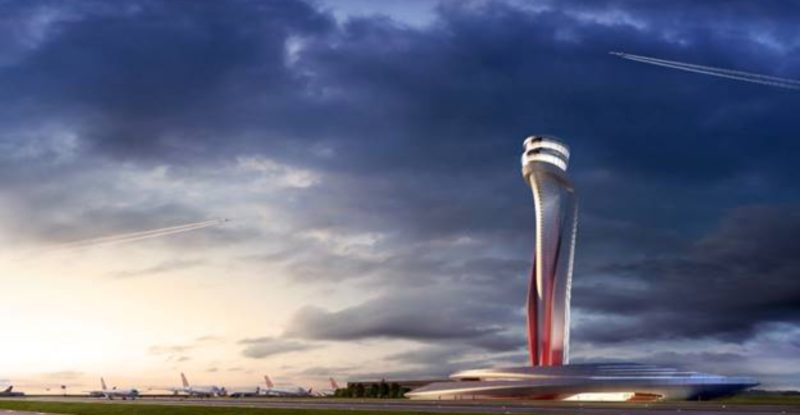 Turkish Airlines welcomes a new era of Turkish aviation with the opening of Istanbul New Airport. The world’s largest international hub will be home to Turkey’s national flag carrier and establishes Istanbul as the central location in the world for aviation and travel. Thanks to its strategic location at the crossroads of east and west, the airport has great potential for Turkish Airlines and the global aviation industry, and will welcome 200 million passengers per year upon final completion.
Turkish Airlines welcomes a new era of Turkish aviation with the opening of Istanbul New Airport. The world’s largest international hub will be home to Turkey’s national flag carrier and establishes Istanbul as the central location in the world for aviation and travel. Thanks to its strategic location at the crossroads of east and west, the airport has great potential for Turkish Airlines and the global aviation industry, and will welcome 200 million passengers per year upon final completion.
To coincide with the 95th anniversary of the founding of the Republic of Turkey, the eagerly-awaited Istanbul New Airport was named “Istanbul Airport” at the opening ceremony yesterday, which was officially opened by President of the Republic of Turkey, Recep Tayyip Erdogan. Passengers on the first Turkish Airlines flights to the new airport, that operated under special circumstances yesterday, received souvenir tickets. The opening of the new aviation hub, combined with the dynamism and energy of Turkish Airlines, will usher in a new era for the carrier.
Following the official opening of Istanbul Airport on October 29, 2018, Turkish Airlines is operating a limited number of domestic and international routes from the new airport, while all operations and existing flight schedules will run as usual from Istanbul Ataturk Airport. New, additional flights will operate from Istanbul New Airport to Ankara, Antalya, Izmir, Azerbaijan (Baku) and TRNC (Ercan) until December 30th. Pursuant to existing planning, on December 31st all operations will move from Istanbul Ataturk Airport to Istanbul Airport.
As the airline that flies to more countries than any other, Turkish Airlines will be able to increase its network extension capacity and opportunities for new routes and flight times, allowing growth for both passenger and cargo transportation. Passengers will benefit from a redefined travel experience throughout a superbly laid out ‘built from scratch’ terminal using the latest technologies and innovations.
The megaproject will be launched in four phases with the final phase set to be complete in 2028. In all, the complex will occupy an area of 76.5 km2, boasting six runways, four terminals, 233 aircraft parking positions, more than 500 check-in desks, and 225,000 employees. Upon completion of the final phase, the largest international flight hub will incorporate offices, residences, hotels, a health center, culture and art buildings, a shopping mall, designer outlets, an EXPO convention center, and meeting and training facilities on site.
At the opening ceremony, M. Ilker Ayci, Chairman of the Board and the Executive Committee of Turkish Airlines commented, “Turkish Airlines starts an exciting new chapter today as we move to our new home at Istanbul Airport. The new hub of our national flag carrier plays an important role in Turkish Airlines’ future growth strategy and will offer a seamless experience to our passengers, international and domestic alike.”
About Turkish Airlines:
Established in 1933 with a fleet of five aircraft, Star Alliance member Turkish Airlines has a fleet of 330 (passenger and cargo) aircraft flying to 304 destinations worldwide with 255 international and 49 domestic, in 122 countries.
About Star Alliance:
The Star Alliance network was established in 1997 as the first truly global airline alliance to offer worldwide reach, recognition and seamless service to the international traveller. Its acceptance by the market has been recognized by numerous awards, including the Air Transport World Market Leadership Award and Best Airline Alliance by both Business Traveller Magazine and Skytrax. The member airlines are: Adria Airways, Aegean Airlines, Air Canada, Air China, Air India, Air New Zealand, ANA, Asiana Airlines, Austrian, Avianca, Avianca Brasil, Brussels Airlines, Copa Airlines, Croatia Airlines, EGYPTAIR, Ethiopian Airlines, EVA Air, LOT Polish Airlines, Lufthansa, Scandinavian Airlines, Shenzhen Airlines, Singapore Airlines, South African Airways, SWISS, TAP Portugal, Turkish Airlines, THAI and United. Overall, the Star Alliance network currently offers more than 18,450 daily flights to 1,300 airports in 190 countries. Further connecting flights are offered by Star Alliance Connecting Partner, Juneyao Airlines.










